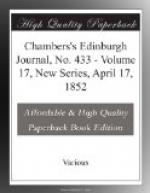on completing his sixth year, was placed with the
rest under a course of education superintended by
the state. Though eminent doctors were engaged
to instruct them in Chinese literature, yet archery
and horsemanship were considered higher accomplishments,
and the most expert masters from Mongolia and Manchooria
trained them in these exercises. They were treated
as mere schoolboys, were allotted a very small income
for their maintenance, were closely confined to the
apartments assigned to them, kept in entire ignorance
of passing events, and allowed little intercourse
with the court—none with the people.
Not till each had passed his twentieth year, was there
any relaxation of this discipline. Taou-Kwang
was about this age when his father ascended the throne,
in consequence of the somewhat capricious appointment
of Keelung, who abdicated, and soon after died.
The new emperor surrounded himself with buffoons,
playactors, and boon-companions. The debaucheries,
jealousies, and cruelties of his reign, remind us of
what we have half sceptically read of Nero and Caligula.
But Taou-Kwang kept aloof alike from the frivolities
and the intrigues of his father’s court:
he seemed to have no desire ungratified so long as
he had his bow and arrows, his horse and matchlock;
and even after he was unexpectedly nominated heir
to the throne, in consequence of having personally
defended his father from a band of assassins, his
new expectations made no difference in his frugal and
modest way of life. The emperor at length died;
it did not clearly appear by what means, and it would
perhaps have been troublesome to inquire: the
empress-dowager waived the claims of her son; and Taou-Kwang
ascended the throne without bloodshed. The luxury
of the preceding reign now gave place to sobriety
and economy; though the usual ceremonies of the court
were strictly observed, they were conducted in the
least expensive manner; and the ruling passion of
the monarch soon appeared to be avarice.
Taou-Kwang had no taste either for literature or the
arts; and he jumbled together in one large magazine
the beautiful pictures, clocks, and musical instruments
accumulated by his ancestors. To explain and
repair these, there had always been Europeans, chiefly
Portuguese, in attendance; and to some of these we
have been indebted in times past for memoirs of the
court of Peking; but Taou-Kwang dismissed the last
of them. It is believed that an undefined dread
of Western power had much to do with this distaste
for the products of its ingenuity.
The only orgies which the emperor seemed desirous
of maintaining, were feasts for the promotion of Manchoo
union; on which occasions, the Manchoos assembled
to eat meat without rice—in order to maintain
the recollection of their Nimrodic origin—and
to drink an intoxicating liquor made of mare’s
milk. He had a favourite sequestered abode at
no great distance from the capital, where he had allowed
the vegetation to run wild and rank, in order to make
it a rural retreat, instead of an imperial park.
All business was excluded from the precincts, and
here the emperor spent much of his time, wandering
solitarily on foot among the trees, amusing himself
with the friends of his youth, or sailing, with some
of the ladies of his family, along the mimic rivers.




